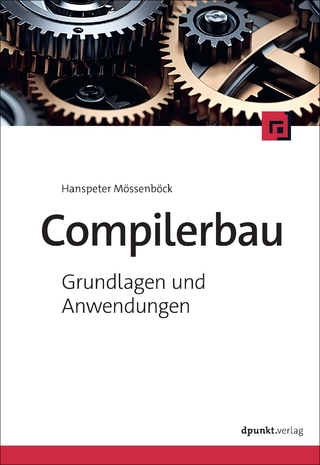
High-Performance Compilers for Parallel Computing
Pearson Education (US) (Verlag)
978-0-8053-2730-4 (ISBN)
- Titel ist leider vergriffen;
keine Neuauflage - Artikel merken
By the author of the classic 1989 monograph, Optimizing Supercompilers for Supercomputers, this book covers the knowledge and skills necessary to build a competitive, advanced compiler for parallel or high-performance computers. Starting with a review of basic terms and algorithms used-such as graphs, trees, and matrix algebra-Wolfe shares the lessons of his 20 years experience developing compiler products such as KAP, the capstone product of Kuck and Associates, Inc., of Champaign, Illinois.
As co-founder in 1979 of Kuck and Associates, Inc., Michael Wolfe helped develop KAP restructuring, parallelizing compiler software. In 1988, Wolfe joined the Oregon Graduate Institute of Science and Technology faculty, directing research on language and compiler issues for high performance computer systems. His current research includes development and implementation of program restructuring transformations to optimize programs for execution on parallel computers, refinement and application of recent results in analysis techniques to low level compiler optimizations, and analysis of data dependence decision algorithms. 0805327304AB04062001
1. High Performance Systems.
An Example Program: Matrix Multiplication.
Structure of a Compiler.
2. Programming Language Features.
Languages for High Performance.
Sequential and Parallel Loops.
Roundoff Error.
3. Basic Graph Concepts.
Sets, Tuples, Logic.
Graphs.
Control Dependence.
4. Review of Linear Algebra.
Real Vectors and Matrices.
Integer Matrices and Lattices.
Linear System of Equations.
System of Integer Equations.
Systems of Linear Inequalities.
Systems of Integer Linear Inequalities.
Extreme Values of Affine Functions.
5. Data Dependence.
Data Dependence in Loops.
Data Dependence in Conditionals.
Data Dependence in Parallel Loops.
Program Dependence Graph.
6. Scalar Analysis with Factored Use-Def Chains.
Constructing Factored Use-Def Chains.
FUD Chains for Arrays.
Finding All Reaching Definitions.
Implicit References in FUD Chains.
InductionVariables Using FUD Chains.
Constant Propagation with FUD Chains.
Data Dependence for Scalars.
7. Data Dependence Analysis for Arrays.
Building the Dependence System.
Dependence System Solvers.
General Solver.
Summary of Solvers.
Complications.
Run-time Dependence Testing.
8. Other Dependence Problems.
Array Region Analysis.
Pointer Analysis.
I/O Dependence.
Procedure Calls.
Interprocedural Analysis.
9. Loop Restructuring.
Simpile Transformations.
Loop Fusion.
Loop Fission.
Loop Reversal.
Loop Interchanging.
Loop Skewing.
Linear Loop Transformations.
Strip-Mining.
Loop Tiling.
Other Loop Transformations.
Interprocedural Transformations.
10. Optimizing for Locality.
Single Reference to Each Array.
Multiple References.
General Tiling.
Fission and Fusion for Locality.
11. Concurrency Analysis.
Code for Concurrent Loops.
Concurrency from Sequential Loops.
Concurrency from Parallel Loops.
Nested Loops.
Roundoff Error.
Exceptions and Debuggers.
12. Vector Analysis.
Vector Code.
Vector Code from Sequential Loops.
Vector Code from Forall Loops.
Nested Loops.
Roundoff Error, Exceptions, and Debuggers.
Multivector Computers.
13. Message-Passing Machines.
SIMD Machines.
MIMD Machines.
Data Layout.
Parallel Code for Array Assignment.
Remote Data Access.
Automatic Data Layout.
Multiple Array Assignments.
Other Topics.
14. Scalable Shared-Memory Machines.
Global Cache Coherence.
Local Cache Coherence.
Latency Tolerant Machines.
Glossary.
References.
Author Index.
Index. 0805327304T04062001
| Erscheint lt. Verlag | 6.7.1995 |
|---|---|
| Verlagsort | Upper Saddle River |
| Sprache | englisch |
| Maße | 243 x 195 mm |
| Gewicht | 962 g |
| Themenwelt | Informatik ► Theorie / Studium ► Compilerbau |
| ISBN-10 | 0-8053-2730-4 / 0805327304 |
| ISBN-13 | 978-0-8053-2730-4 / 9780805327304 |
| Zustand | Neuware |
| Haben Sie eine Frage zum Produkt? |
aus dem Bereich


